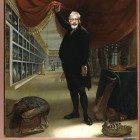
Scholarly Research and Writing in the Digital Age
EXTRACT:
Along the way, I kept track of my process, to help me think about a talk I’ll be giving in October. I send students off to write research papers, and so I should be reflexive about my own work, in order to better teach them how to do research. And I was curious to see how new digital tools would change the way I work, and especially if they would change the questions I might ask and answer in my research. The answers I found: Yes, I could ask and answer different questions, especially about museum visitors. Yes, a research plan is still necessary; serendipitous Googling is not enough. No, digital is not enough; it’s still necessary to visit libraries. And a good reminder: research is only the first part of writing a scholarly paper. It’s also about knowing the big picture, puzzling out connections and making sense of relationships, and most of all, creating meaning. That part hasn’t changed.
Discovery is perhaps the stage of scholarship that’s seen the largest change. Scholars of 19th century American history have a remarkable amount of material available to them online. Newspapers, books, journals, all of them word-searchable. These sources would have been all but impossible to use earlier – I might have read on microfilm the newspapers closest to the Navy Yard, for those days where I knew something had happened. But now it’s easy to simply check out a few hundred newspapers, or a few million books, with a few clicks.
This comes with some challenges.
Phi Beta Iota: What is really remarkable is that despite wild spending by the secret world (now $80 billion a year) and huge spending by Google (generally $10 in stockholder income for every $1 in earnings–not a paying proposition in the long run), both machine processing and computer-aided tools for the analysis of all information in all languages all the time continue to STINK. No one has been held accountable for mandating geospatial attributes for every datum in every discipline and domain; no one has been held accountable for failing to break down the barriers to information-sharing and sense-making across the eight communities (academic, civil society, commerce, government, law enforcement, media, military, and non-governmental/non-profit) that each have a separate piece of the total picture on anything. We all knew the requirements in 1985-1989. Still today no government and no corporation and no international organization has gotten their act together. Proprietary does not scale, is not agile, does not work well with others, and is generally full of both security holes and end-user disrespect. At the same time, NSA and other US Government authorities have been severely remiss–if not in outright betrayal of the public trust–in failing to heed the many warnings and specific recommendations of many of us (four of us in the below 1994 letter) with respect to getting cyber-security and cyber-education right from the early days.
See Also:
1989 Webb (US) CATALYST: Computer-Aided Tools for the Analysis of Science & Technology
1994 Sounding the Alarm on Cyber-Security
Worth a Look: 1989 All-Source Fusion Analytic Workstation–The Four Requirements Documents



